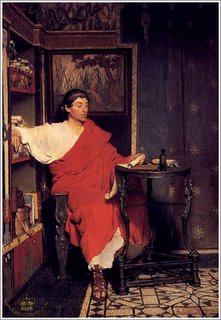
Marcus Tullius Tiro was an ex slave born in a small village called Arpinum, in Italy about 60 miles south east of Rome. Tiro was an intelligent man who, in 63 BC, became secretary to Senator Cicero, a man who was known to enjoy hearing his own voice. He often gave long speeches in his own particular oratory style in the Senate of Rome. But, as Tiro watched and listened, he saw an opportunity to please and be of extra value to his master. He devised a method of recording his master’s speeches using his own specific marks that he could later transcribe to a proper written form. Cicero was delighted to know his speeches were recorded and could be read back to him verbatim.
Although the concept of recording speeches verbatim had been attempted by the Greeks many years earlier, it was Tiro who mastered the speed writing technique that is perhaps the forerunner of shorthand as we know it today. Tiro shared his technique with other scribes but it was not to stop there, soon Tiro’s Marks were taught in the schools of Rome. During Tiro’s employment for Cicero, he recorded more than 600 speeches and letters using his own specialized method of rapid writing.
Over the centuries, those people who had the ability to transcribe speeches and letters verbatim were highly valued employees. These scribes adapted and changed the characters to suit the particular employment, business or profession. Therefore only they could transcribe their own marks making that individual a highly prized employee.
Today, Pittman shorthand is the most commonly used method of taking dictation and recording speeches and letters. Even in the Houses of Parliament, London, speeches are still recorded verbatim by transcribers who work on rotation. The reporters work for five or ten minutes, then they re-dictate to a secretary who types up the transcripts.
Charles Dickens was just such a transcriber. He worked in the Houses of Parliament for almost six years and was well thought of by his colleagues. One contemporary described Dickens as “universally reputed to be the rapidest and more accurate shorthand-writer in the gallery” and another wrote, “A more talented reporter never occupied a seat in the Gallery of either House of Parliament.”
Here in the US, a fledgling Senate struggled with recording the speeches given by its members. A brochure called The Official Reporters of Debates of the U.S. Senate prepared under the direction of Walter J. Stewart, Secretary of the Senate, states that sometimes the reporters had difficulty hearing the speeches and even identifying the speaker. During the First Congress, Thomas Lloyd privately reported and published the debates describing the speakers as “the baldheaded man” or “the man in blue coat and wig.”
Assistant U.S. Senate Historian Betty K. Koed reported that “the last of the Senate's Reporters of Debates who used shorthand retired in the 1980s. Other reporters had begun using stenographic machines, in place of shorthand methods, in the late 1970s.”
While he served as majority leader of the United States Senate, Lyndon B. Johnson once observed that there were few documents more important than the congressional record “Locked in its pages are the debate, the resolutions, the bills, the memorials, the petitions...and that without the able, loyal, hard working, highly skilled corps of Official Reports who take down the debates.”

